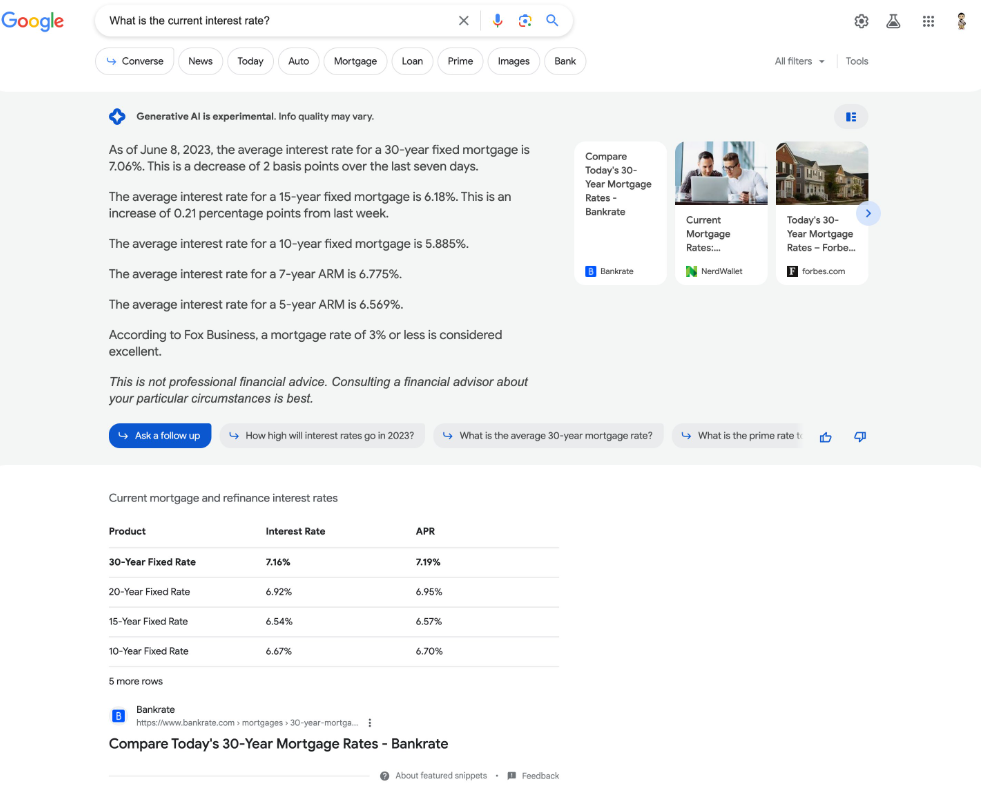In the past few years new products have appeared, greatly changing the way we use search engines. Whether it be enriched results like ‘People Also Ask’ or the Lens feature which recognizes images; Google’s functionality, along with that of other search engines’ has dramatically increased. We are a long way from the days of such inaccurate search results that we would actually have to venture past the first page of results and onto the second or even the third!
Artificial intelligence is everywhere these days, and we are truly entering a new paradigm in terms of its accessibility. As far as search engines go, AI generated search results are the latest development, but what exactly are they? How do they work? How will they be useful? These are just a few of the questions we’ll explore below.
WHAT IS GOOGLE SEARCH GENERATIVE EXPERIENCE (SGE)?
SGE stands for Search Generative Experience. It’s a new feature offered within Google’s search engine, based on Generative AI.
Generative artificial intelligence is the generation of content (images, video, text, voice) by AI. AI is trained on automatic learning models, to create original content such as images, text or music, by simulating the human creation process. It involves a number of techniques which allow computers to generate new data by pulling from statistical models and patterns previously learned from a collection of training data. These generative models can produce impressive and innovative results, but it is recommended that you have a human validation and supervision process in place alongside.
When it comes to search engines, we are now hearing of a new type of result which will soon appear on our screens. The results will be more detailed, encompassing the object of the search by exploring associated themes in order to better advise and respond to users’ questions. In the Google SGE results, you will have the ability to add to your search terms without restarting the search from scratch, in order to find the information you need. For example, if I was to search for a shoulder exercise for kayakers, for a trip coming up in 3 months’ time, the SGE results could show me training plans structured across a number of weeks.
Here is what this would look like:
Available in Beta in the US only (at the time of print – June 2023) Google’s SGE is currently only accessible by requesting it in Search Labs. Google Search Labs is an initiative from Google which aims to test new features for its search engine and products. It consists of an experimental environment where users can access features which are still in development stage, and provide feedback on their experiences.

Users selected to participate in these tests can experiment with the features before they become available to the wider public, and contribute to their improvement by sharing their comments and suggestions with Google. These tests allow Google to collect data along with precious user feedback so that they can evaluate the viability and usability of these new features before integrating them into their principal search engine.
Bear in mind when taking part in any SGE user tests that Google is dedicated to evolving these Beta tools.
WHAT WILL THIS CHANGE?
Google SGE is much more than just an algorithm update, it could revolutionize the way in which we use search engines altogether. It is therefore essential to start asking ourselves how this could change our approach to search engines. How are users going to interact with organic results in comparison to sponsored or AI generated results? Will we be able to track the outcomes (clicks and impressions) of these new results?
The results generated by SGE will appear in the ‘zero’ position – that is to say, right under the search bar – and they will be more imposing than other results. It should be impossible to miss an AI generated result.
The ultimate aim of SGE results is to push the subject and to embed it in the SERPs (search engine result page.) Could this become an obstacle for organic traffic? Currently it is difficult to say. Will this accentuate the ‘zero-click’ phenomenon? Probably, yes. Will users actually click on the button which allows them to generate an SGE result? We’lll quickly find out once this new interface becomes globally available.

SHOPPING WITH SGE – GOOGLE SHOPPING GRAPH
In the video above, one of the first requests made via the SGE result feature, is for support with online shopping (How to dress for an outdoor wedding in Miami?) This extract of SGE SERP results effectively showcases how Google is aiming to influence changes in behavior. Here, this involves transforming a simple request into a search for a product which addresses a particular need, perhaps even one that the user doesn’t yet realize they have.
This type of result in the SERPs tells us that The Google Shopping Graph will be central to all e-commerce sites wishing to gain even a little bit of visibility. Now more than ever, is the time to optimize your presence with Shopping Graph. What’s more, the PDP (Product Detail page) will also be brought to the forefront through this new feature from Google. If SGE wants to become as useful as it claims it can be, the results will, of course, need to be based on the most readily available and easy to understand PDPs.

STRUCTURED DATA
If there was one aspect of your SEO which would be worth keeping a closer eye on once SGE is launched in Canada, it would have to be structured data. It will most likely be your FAQ section that will become central to this new environment. It seems that SGE results will be largely based on this format of universal data, which will reduce the research work of Google by providing clearer naming conventions for data presented on websites. As we know that the question format is increasingly popular in terms of Google requests, particularly since the rise of voice activation, it makes sense to focus on FAQs.
Virtual assistants based on AI, such as Google Assistant, Siri or Amazon Alexa, have gained popularity over the past few years. They use artificial intelligence technology to manage and understand requests in natural language, transforming voice commands into search requests. SERPs adapt to voice activation by presenting more concise responses and structured data which is easy to consume by these devices.
LONG TAIL KEYWORDS
One of the most interesting changes which will come with SGE will be better understanding of questions or complex statements by Google. The comprehension of multiple factors has always been difficult for Google – until now – SGE results should be able to benefit from the power of AI to produce results which take into account numerous elements. Staying with the example of Miami, we can see that various factors have been considered in order to generate a variety of responses, such as:
- The month of the event and the temperature
- The town
- The style of clothing (chic, casual, eveningwear, etc.)
- The type of clothing (light materials)
- Trending colors for the season
- Quick delivery
The fact that a request so complex can be answered speaks to the possibilities which will become available to us in the future. As requests made in question form continue to rise, it seems that the creation of an environment that encompasses multiple aspects of the user’s question has arrived right on time.
MORE FOCUS ON VIDEO
SGE results aim to be more complete than the usual SERPs. Amongst the obvious addition of AI generated results into Google, we can also see that videos are promoted as often as is possible in the results. YouTube seems to see the biggest portion of this promotional ‘cake’, as it is owned by Google. And going back to the aforementioned point, video structured data will also become essential.
LOCAL RESULTS
From the myriad sources we consulted, if there was one point which kept popping up amongst the analysis on this subject, it was the difficult presence of AI generated results for all things local. Google maps is already a fabulous example of functionality, execution and precision. It would seem that SGE generated results do not offer any further benefits for the time being than we already have with good old Maps.
WHAT DOES DIALEKTA THINK ABOUT SGE (AT LEAST FOR MOMENT?)
Coming back to the example of outfits for a wedding in Miami, we see straight away that searching for a dress also gives us suggestions on shoes and more, without us having to restart our search. This looks like a well integrated example, but could be different in practice.
In the case of clothing searches, it seems to be a fairly well integrated feature, but what about searches for more complex products, or where many more factors are to be taken into account, like a car? We know that around 46% of product searches start on Google, maybe AI generated results could more precisely reflect the user’s true intention and direct them towards a solution which suits their buying habits.
We can look at this new product from a million different angles, but the real test will be whether it is picked up or not by Google users. The SGE user experience seems to be built around becoming more and more personalised and attentive to what users are typing into their search engines. It will finally be possible to develop on an existing search, a long awaited improvement in user experience.
There will also be the possibility to ask more complex questions and to receive more comprehensive results which seek continuously to better understand the intention behind each search. With this development, Google is also offering a direct response to its competitor Microsoft Bing which has made a head start on the AI front with the integration of ChatGPT into its search engine. Google must wait no longer, it must respond and evolve its search engine.
On the other hand, it seems a little contradictory to display such well-rounded and comprehensive results on one sole request now that we know that more than 60% of searches are made via a handheld device (63% to be precise). Will the AI generated results also be formatted for mobile? We feel this is a crucial point to consider.
WHAT WILL BE THE IMPACT ON ORGANIC AND SPONSORED RESULTS?
A question which many SEO specialists are asking is whether we will see a fall in the amount of organic traffic generated. It’s difficult to predict a response to this question, but we can surmise that this environment, created by SGE, around the user’s question, will keep them in the Google search engine for longer than was previously the case. As SGE results aim to be more complete, will they lead to a fall in site navigation? How can we ensure that a site is considered and suggested in the Google SGE results? Are there any SEO criteria which will become more important than others for SGE results?
In regards to SEM, we have seen for a few years now that the ‘sponsored’ label has become more and more discreet on search results. We have no doubt that it will continue to be the aim of SGE results to show adverts in a more appropriate format. But what will happen in terms of performance, and if the SGE results appear above the sponsored ones, taking up a large portion of the page?
On a lighter note, have you ever stayed up late, sat in bed maybe, searching for info on intriguing topics such as the pyramids or the human genome? If there is a section of the population who will be truly well served by SGE results, it would certainly be those who love researching interesting facts and falling down internet rabbit holes! Not only are all the responses you’re looking for available in one sole search, but all the context you could need to truly understand your initial question, will be shown in the results too; and you will also have the ability to ask further questions.
ARE YOU READY FOR GOOGLE SGE?
This is more than a simple functionality. Here, Google is offering a new way to interact with your search engine, and organic, sponsored and AI generated results. The Search Generative Experience from Google is sure to be under the microscope for marketers everywhere once it is launched in Canada!
To start prepping from today, we recommend applying these best practise strategies:
- Offer rich, unique, quality content to users. For a while now, Google has been pushing content validation via E-E-A-T (Experience – Expertise – Authoritativeness – Trustworthiness).
- Put into place structured data to simplify the comprehension of your code and content by search engines, and also to increase your visibility.
- Be sure to make the most of the Google tools available to you. Fill-out and regularly update your Google My Business document. Optimize your product feed on your Google Merchant Centre. Optimise the titles and descriptions of your YouTube videos.
The journey into the world of generative AI is only just beginning! This AI will occupy more and more space in our marketing strategies and toolkits. It will become essential to consider AI when looking to surpass your competitors, and above all in order to better serve users when they are looking for your products and services. Got questions on the impact of Google SGE results? Want to prepare for these changes? Contact our SEO experts in Montreal.





